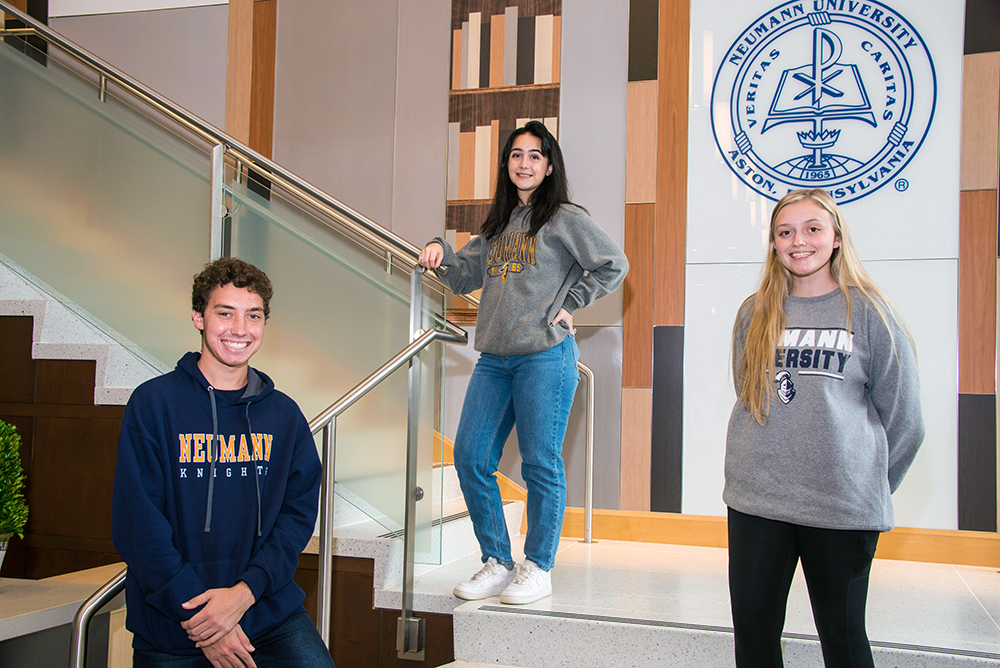
Three first-year students in Professor Jim Kain’s Honors Rhetoric and Writing class have tackled COVID-related topics for their fall research projects. The trio focused on issues that connect to their values and prospective career paths.
Maria Ramunno
A mathematics major, Maria Ramunno brings a love of biology and statistics to her research. “I studied biotechnology in high school and took AP statistics. I want to make biostatistics my career,” she says.
In her research paper, entitled “Biostatistical Use in COVID-19,” she writes: “Biostatistics plays an important role in understanding a virus and combating it properly. When a virus has its first outbreak, many people will study the virus’ habits and trends, but biostatisticians make sense of what they collect and put the information in a way we can interpret. Their job is not money based or politically driven. Biostatisticians’ top concern is public safety.”
This semester, Maria has read medical journal articles that “focus on the connection between certain symptoms of the virus and the severity of the disease, and the association of severity with gender.” She believes that biostatistics generate information that can help health professionals.
She is concerned that “public distrust of a coronavirus vaccine has grown since May.” One of her conclusions is that “until a vaccine can be released to the public in a proper time frame, we need to listen to our experts who have real concerns for the common good, and not let aspects that do not affect the medical field alter our beliefs.”
Madison Lipford
Madison Lipford, a nursing major who wants to be a pediatric nurse, has investigated whether children should receive a coronavirus vaccine when one is available. “The virus has taken over the whole country, and it could be around for years,” she admits. “I may have to give the vaccine when I’m a nurse, so I want to learn as much about it as I can.”
She notes that hundreds of thousands of cases have occurred in children (those under 18), who are at a lower risk of serious consequences from the disease, and that “children have an immune system that’s different than adults, and they need a completely different vaccine.”
From her research, Madison has learned that “A few companies are tiptoeing around a vaccine for children, but most are focused on a vaccine for adults. They want to make sure it’s safe for adults first.”
She concludes that “In the past, vaccines have been successfully created to help children fight off diseases such as tuberculosis and tetanus ... There are many questions about whether children should get a vaccine for coronavirus, but most experts seem to agree that children should be vaccinated” when an appropriate vaccine is available.
Joseph Kendrick
Joseph Kendrick has been researching “The Inequalities of Virtual Learning.” Committed to a career based on helping others, he is concerned that the achievement gap between low-income and other children is becoming wider because of the pandemic.
His research has shown that “Various inequalities have been seen in education regarding financial status, geographical location, race, and students with disabilities. Virtual learning is already increasing these educational gaps with complications including lack of technology, lack of internet access, lack of wealth, and limited resources.”
He also notes that the issue of “equal access to electronic resources” like iPads and Wi-Fi will continue when the health crisis ends. “The pandemic has exacerbated this situation, but the disparity will still exist after COVID.”
Kendrick concludes that political leadership and government funding may be necessary. “Although the gap is continuing to grow, there are solutions to the educational problems,” he writes, “but the government will need to come together to face these challenges head on.”
All three have impressed Professor Kain. “These are freshmen doing their first semester of college under strange and challenging circumstances, yet they have shown an amazing amount of self-discipline, responsibility, and purpose,” he says. “And they have each picked research topics that are not only relevant but driven by a sense of concern for others and for the truth.”
 CHALLENGE
CHALLENGE





